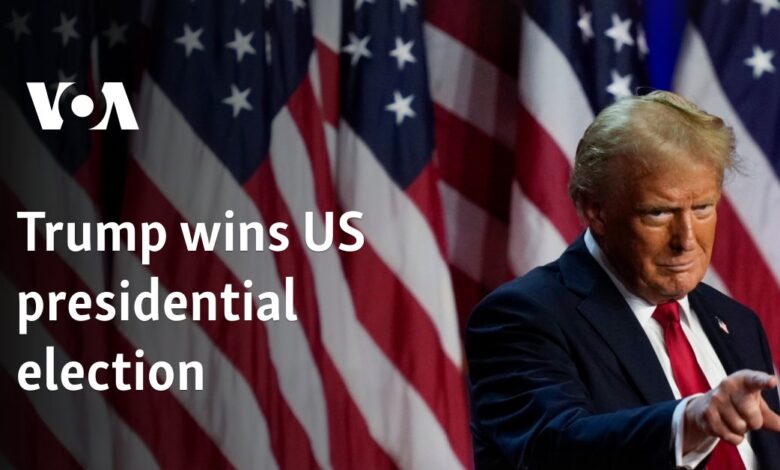Trump wins US presidential election

Former U.S. President Donald Trump defeated Vice President Kamala Harris to earn a new four-year term as the country’s leader.
In a tightly contested race, Trump secured at least 277 of the 538 available electoral votes in Tuesday’s election, giving him the necessary majority to become the first U.S. leader to win non-consecutive terms since the 1890s.
Harris, the Democratic candidate who joined the race late after President Joe Biden dropped out in July, was trying to become the first woman elected to the U.S. presidency.
Trump claimed victory early Wednesday as he thanked his supporters at a rally in Florida.
“This was a movement like nobody’s ever seen before, and, frankly, this was, I believe, the greatest political movement of all time,” Trump said.
He pledged to “fix our borders” and “fix everything in our country.”
Trump also said he would work to deliver a “strong, safe and prosperous America.”
A Harris campaign official told a crowd of her supporters in Washington that she would not address the gathering overnight but would speak later Wednesday.
In the U.S. system, where the presidential election is tallied in a series of state-by-state contests, both Harris and Trump were quickly declared winners in states where their parties enjoy clear majority support, while the nation focused on roughly seven so-called battleground states that were expected to tip the balance in the direction of the winner.
Ultimately it was Trump’s victories in Pennsylvania, Georgia, North Carolina and Wisconsin that gave him the advantage.
Republican success Tuesday extended to Congress, where the party won back a majority in the Senate with at least 51 of 100 seats. Control of the House of Representatives, which is currently held by Republicans, was not yet decided early Wednesday.
Trump served from 2017-2021 but left office after losing to Biden in an election that Trump continued to falsely assert that he won. That denial helped fuel the January 6, 2021, attack on the U.S. Capitol by a mob of his supporters who disrupted the official tallying of the 2020 election results.
Trump and his allies also launched numerous legal challenges after the 2020 vote, with state and federal judges eventually dismissing more than 50 lawsuits.
Since leaving office, Trump was convicted of 34 charges linked to hush money payments he made to an adult film actress in the lead-up to the 2016 election. Sentencing in that case is scheduled for November 26. Trump was also indicted in three other cases, including two accusing him of trying to illegally overturn the 2020 election and another alleging he took hundreds of highly secret national security documents to his Florida home.
Trump is scheduled to be inaugurated for a new term on January 20.
A key foreign policy focus in a new Trump administration will be relations between the United States and China, including subjects such as trade, Taiwan and China’s actions in the South China Sea.
Trump instituted a series of tariffs against Chinese imports amid a trade war with China during his previous administration.
Vincent Wang, dean of the college of arts and sciences at Adelphi University, told VOA Mandarin that China would be less likely to take an aggressive stance than it would have been if Harris won.
“If Trump is elected, I think China may not dare, because he doesn’t go through drafts, he has already said harsh words. If he wakes up today, he might say he’s going to raise tariffs by 200 percent. If he wakes up tomorrow, he might want to bomb Beijing. So I think this so-called this Trump-type deterrent, on the contrary, will make them a little bit more restrained,” Wang said Tuesday.




